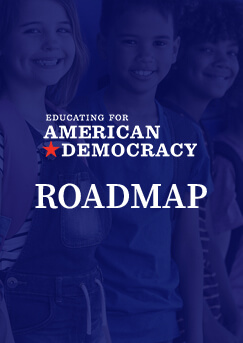The curated resources linked below are an initial sample of the resources coming from a collaborative and rigorous review process with the EAD Content Curation Task Force.
 Reset All
Reset All
Students explore the connection between art and activism by analyzing a sculpture from the Autry Museum about a desert community. Students are also invited to participate in activism by creating their own sculpture using materials from nature and around the home.

The Roadmap

Autry Museum of the American West


John F. Kennedy’s inaugural address inspired children and adults to see the importance of civic action and public service. His historic words, “Ask not what your country can do for you – ask what you can do for your country,” challenged every American to contribute in some way to the public good. In this lesson, students learn about a theme in President Kennedy’s inaugural address, civic action, and consider how it applies to their own lives.

The Roadmap


John F. Kennedy Presidential Library and Museum


The American ability to inspire--which we call exceptionalism--is not automatic. It takes continued efforts to be realized in a changing world. In this series, scholars at the Hoover Institution--professors, thinkers, and practitioners of global renown in their respective fields--offer a series of accessible policy ideas for civic, economic, and security architecture that would shore up the long-term foundations of American strengths.

The Roadmap



Hoover Institution


Discover what it takes to become an informed voter — from knowing where you stand on important issues to uncovering what you need to know about candidates.

The Roadmap

iCivics, Inc.


The Checkology virtual classroom is a free browser-based e-learning platform with 14 interactive news literacy lessons led by subject matter experts. Checkology also includes dozens of challenges and exercises to extend student learning, a verification training center to teach students how to fact-check like the pros and a journalist directory to connect classroom teachers with journalist volunteers for classroom visits.

The Roadmap


The News Literacy Project


In this lesson, students explore ideas about citizenship, power, and responsibility by listening to and discussing a podcast featuring an interview with Eric Liu, the founder and CEO of Citizen University, to deepen their understanding of citizen power.

The Roadmap



Facing History and Ourselves


As a foundation for studying the rights and responsibilities of citizens, students will learn what it means to be a citizen and how people become US citizens. They will also examine how the right of US citizenship has changed over time.

The Roadmap


iCivics, Inc.


Students learn the basic steps of civic action and what it takes to make change, following the "I AM" model (Inform, Act, Maintain). Along the way, they explore the change-making examples of four key movements: women's rights, disability awareness, Native American rights, and migrant farm worker rights.

The Roadmap


iCivics, Inc.


Learn about local government by playing a county official responding to citizen requests.

The Roadmap
iCivics, Inc.


In this lesson, students will think about the definition of democracy and then consider how it might relate to the communities and culture in which they live and participate.

The Roadmap


Facing History and Ourselves


In this lesson, students will examine the final speech delivered by Dr. Martin Luther King Jr. and deepen their understanding of the text by illustrating and summarizing Dr. King’s main ideas and imagery, and they will then use excerpts to create a class poem and later reflect on how they might “choose to participate” in creating of a more just community, nation, or world.

The Roadmap




Facing History and Ourselves


Eagle Eye Citizen allows teachers and students to solve or create online interactive challenges while engaging with rich Library of Congress primary sources. Students learn civics content as well as primary source analysis skills.

The Roadmap


Roy Rosenzweig Center for History and New Media





